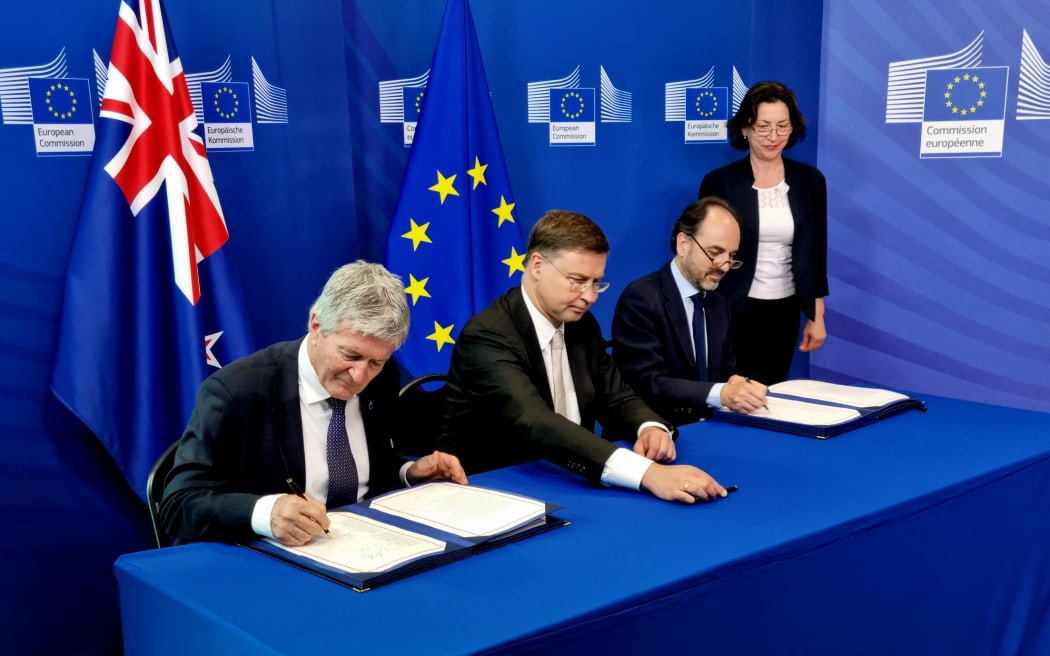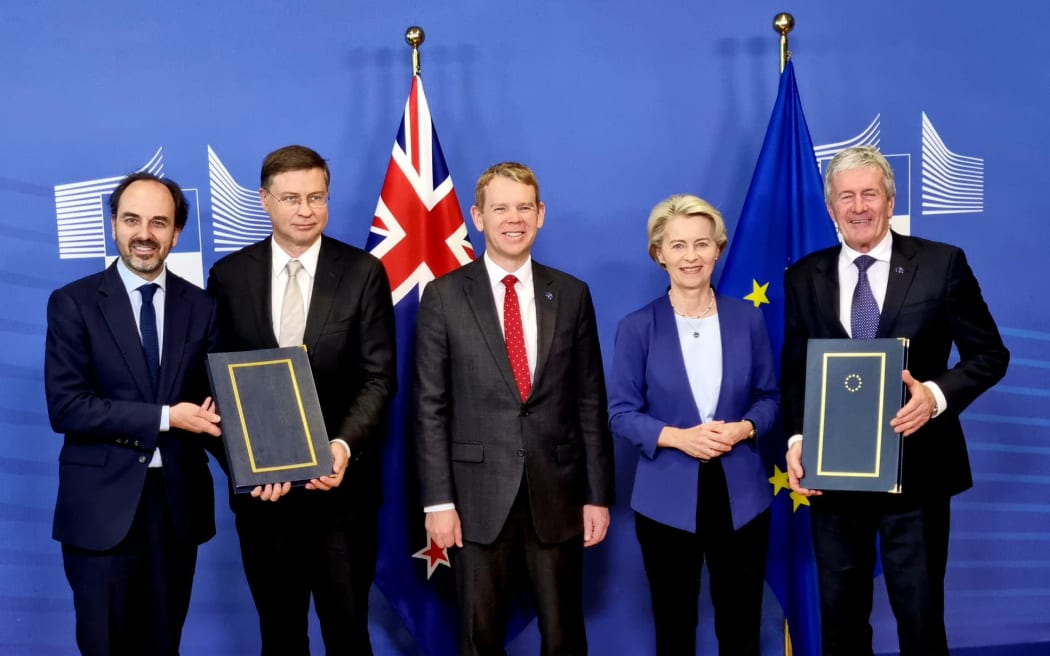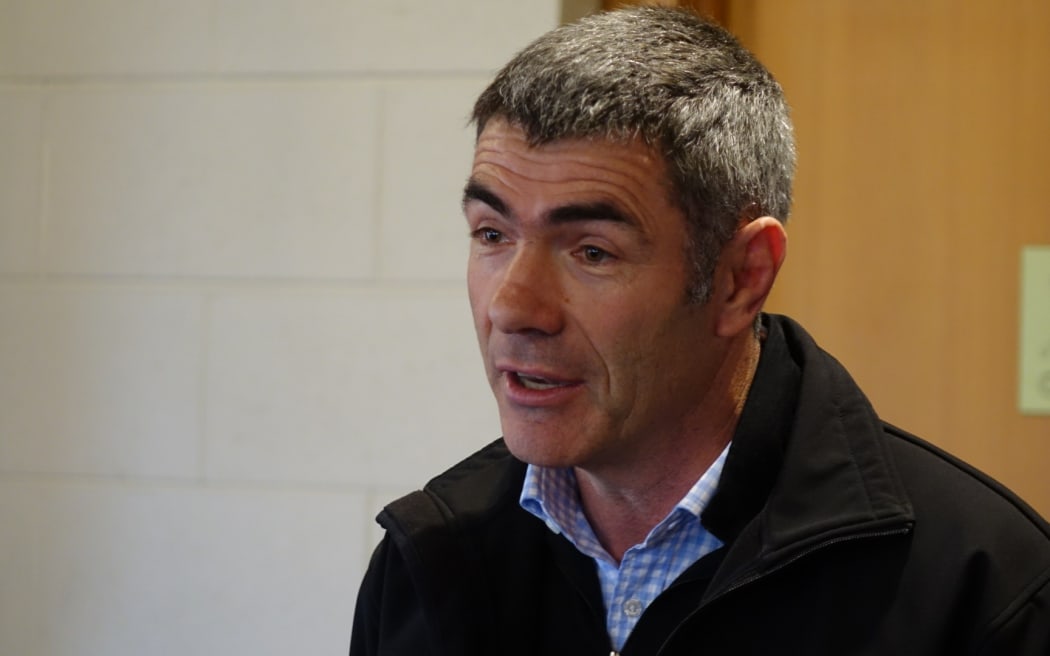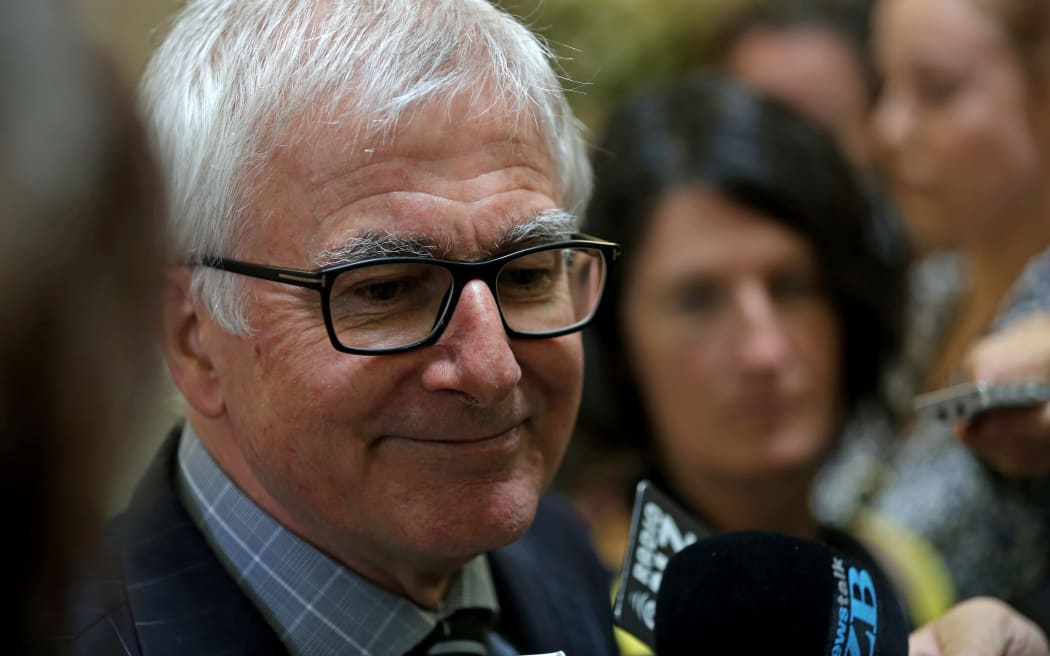Former National trade minister 'very pleased' by EU FTA signing

Former National Party trade minister Tim Groser is welcoming the EU free trade agreement as a "step forward", saying disappointment over meat and dairy would be no reason to walk away.
He says the deal is more valuable strategically and politically than economically for the EU bloc, and helps New Zealand diversify away from China.
New Zealand's Prime Minister Chris Hipkins signed the deal in Brussels overnight after the European Council gave it the green light late last month.
Detailed negotiations had been ongoing for about four years before the two sides finally came to terms just over a year ago, and the deal still needs approval from the European and New Zealand Parliaments - though given EU member states have already given agreement that's expected to be fairly straightforward.
Complaints have mostly come from farmers: Kiwi meat and dairy groups have been frustrated over lack of improved access for them, while European farming groups have expressed fears of increased market pressure for their own producers.

Hipkins told RNZ's political editor Jane Patterson it was a good deal overall and was optimistic about getting the deal ratified.
"Did we get everything we wanted? No, of course we didn't, but actually overall it's a very good deal for New Zealand," he said.
Meat Industry Association chair Nathan Guy, a former National MP in John Key's government, said they had been hoping for more access for beef.
"We ended up getting 10,000 tonne over seven years, and the Europeans consume 6.5 million tonnes a year," he said. "We do know that the Europeans are generally very wealthy - there's 450 million of them that are prepared pay more, basically a premium, for what we produce here in a sustainable way - and unfortunately we didn't get what we asked for."

But he was philosophical about the deal overall.
"I do also happen to chair Apiculture New Zealand that leads the honey industry, and I know they're celebrating today the signing - particularly with mānuka and other honeys coming online in three years' time," he said. "Certainly for some of the primary sector it's a day of celebration."
"In terms of sheep meat, we did get a lift in our quota when it was split between the European Union and the UK so that is a small positive - particularly if there are geopolitical issues in the future."
He also acknowledged the difficulties of getting more access for meat and dairy.
"We do realise that the European Union, a lot of it is very protectionist. If you look at France, they're not very sympathetic to free trade, so I guess the focus now is let's use all of our diplomatic skills to get it shunted across the line."
Groser was a trade minister in Key's government and told Morning Report the right way to look at the deal was as a step forward.
"I think that's exactly the right way to look at it. Look, we've made a lot of progress in the last 35 years in opening up markets to New Zealand," he said.
He said the deal also had to be looked at alongside the New Zealand FTA with the United Kingdom, and in the context of "deeply protectionist sentiment" from the EU dairy and meat sectors.
"I'm sure our officials who would have negotiated the deals pushed as hard as they could and got what they can. Overall, certainly not a reason for walking away from it in my opinion."
The deal would particularly help with diversifying away from New Zealand's reliance on the Chinese market, he said - and that was even true in a limited way for meat.
"The sheep meat deal in the EU deal is actually quite a valuable insurance policy against China turning south on sheep meat, because China's displaced the Europeans as our principal export market."

Groser said from the EU perspective, the deal was likely more valuable in terms of increasing strategic and political links.
"I think they would look at it entirely in those lights, I mean they don't need an FTA with New Zealand for commercial reasons - I mean, for heaven's sake our market's effectively already completely open to them - so they would be seeing it in strategic terms.
"Also our shared interest in trying to deal with the headscratching problem which is where the hell is the United States, which is walking away on trade right across the board."
EU Ambassador to New Zealand Nina Obermaier said the ground gained for New Zealand farmers was commercially meaningful.
"I acknowledge that in particular your beef and dairy producers would've hoped for more - our farmers would've wanted less access, so I think we struck the right balance," she said. "We knew right from the start that in particular beef and dairy would be sensitive sectors. I believe the overall result is nevertheless worth it for both sides."
She also highlighted strategic and political gains as being key for the European side.
"The Indo-Pacific, this enormous region of which you are a part of, is the centre of economic gravity, and strengthening our ties with partners in the Indo-Pacific is very important," she said.
"This deal shows that good deals can be made whilst the global trading system is under threat. So this is way more than trade."
The deal has been praised in some quarters for its inclusion of emissions reduction targets, but Groser said he saw that as political messaging to help get the deal through the European Parliament.
"No New Zealand government's going to walk away from doing the right thing on climate change, we can debate the precise way in which we do it.
"It's sort of, you can't just do trade any longer on a pure trade basis - you have to have a social licence to engage in trade and that's part of that political process as far as I'm concerned."
The deal is set to remove 91 percent of tariffs on New Zealand goods into the EU from day one of coming into force, eventually rising to 97 percent.
Red meat and dairy are expected to get up to $120 million worth of new annual export revenue on day one, with estimates of more than $600m within seven years.
It is anticipated to enter into force in the first half of 2024 once the final steps of ratification and passing related legislation have been completed.
Obermaier said all signs pointed towards successful ratification.
"The International Trade Committee was in New Zealand last year, was very warmly welcomed and I think there's a lot of goodwill towards New Zealand.
"Member states have already approved the deal two weeks ago - under Swedish presidency - which is also the reason for the PM going to Stockholm later today, and now it will be up to Parliamentarians to give their consent."